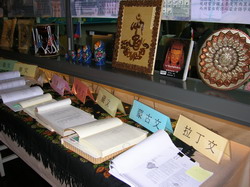Language Is a Lifelong Ability

In 2004, Tu commissioned the College of Foreign Languages & Literature at the National Cheng Chi University to build a Foreign Language Center in Northern Taiwan. Last year, the center started offering 23 different language courses. Besides English, German, French and Japanese, it offered language courses in Mongolian, Uighur language, Persian, Czech and Polish. It plans to have 24 different language courses this year.
The Education Minister came up with the idea after visiting academic institutions in the EU and the U.S. He realized that Taiwan had a long way to go to fully integrate with the international community.
Compared with the library collections in the universities in E.U. or U.S., the collections in Taiwan are limited to English.
In the nineteenth century, westerners would learn the language of their target countriesbefore invading them. This was the case with Imperial Japan. The Japanese first studied Chinese history and language before waging war.
"We are not going to imitate Japan's past imperialist ambitions," said Tu. "But we would like everyone to have a global view."
Multi-lingual talents are needed for world trade. There have been much discussion about establishing a foothold in the Southeast Asian market. But the fact is we have no sufficient academic documents, nor the professional personnel to fully implement this economic policy. It is hard to understand the real needs of Southeast Asians and their culture through just English.
Multi-lingualism is critical to Taiwan's economic development. International trade drove Taiwan's economy. Therefore, those engaged in education should put more thought on global deployment as the key to Taiwan's continued development and ask if we have the linguistic talents for it?
Attachment(s) for download
- Chinese textChinese text.doc
- Chinese textChinese text.doc
